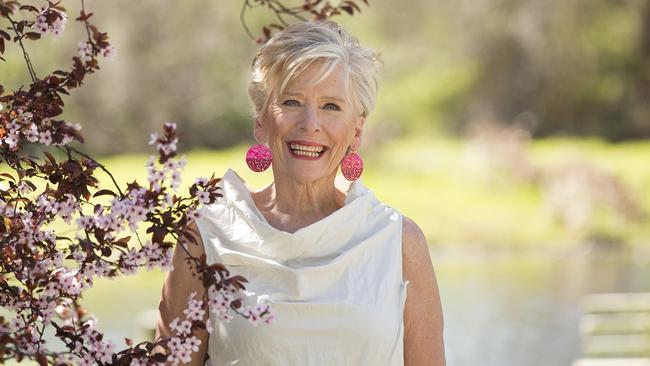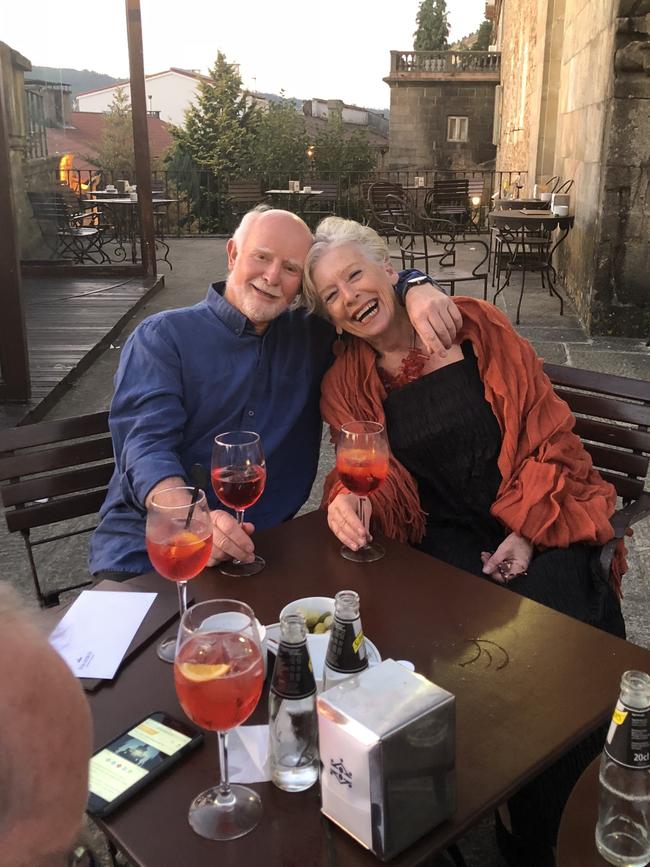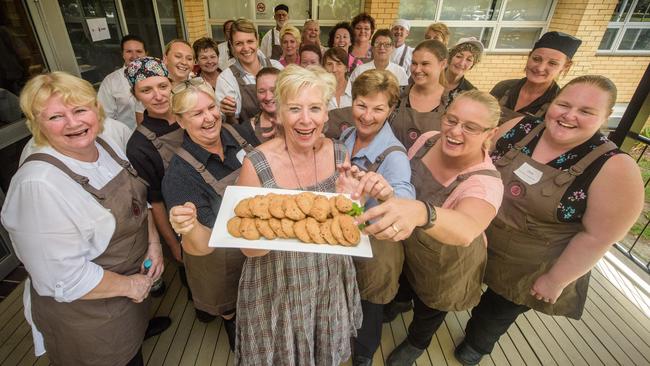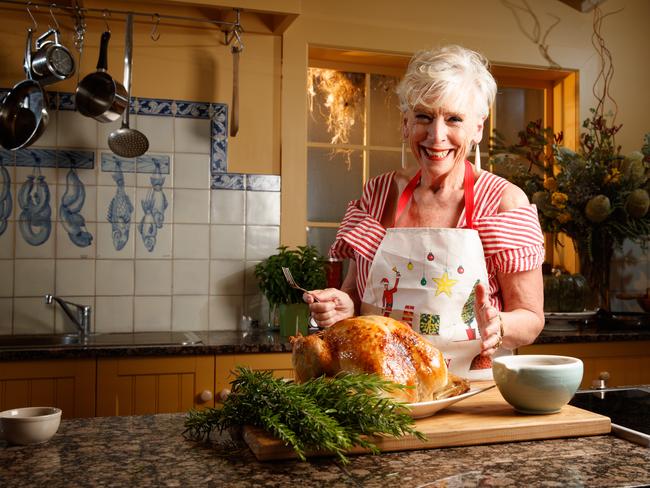Maggie Beer on her fall, recovery and her mission to improve the way older Australians eat
The much-loved chef sustained shocking injuries after a fall at home in August. After three emergency surgeries and an extended period of recovery, the beloved cook is set on returning to the kitchen for Christmas.

You had a terrible fall back in August. How are you now? I’ve come such a long way, considering I’ve been home from hospital for a month and when I first came home I’d be up for an hour and back to bed for an hour. Yesterday, I was up all day without resting – that is a monumental step forward. Full recovery takes time and I’m not the most patient person in the world. So I’m learning to be a different kind of person, accepting that things go slowly sometimes.
Can you tell us what happened? I was at home. I was on the way to bed and fell from the top of our attic stairs right down to the bottom. I really did a number on myself. I had three emergency operations, one day after the other, and each time I woke up I would ask the surgeon, “Am I going to make a full recovery?” They said yes every time and I absolutely believed it, and now it’s true. Yes, there were broken bones, and what they call wedge fractures, and plenty of other stuff but we don’t need to go into all that.

Is Maggie Beer a good patient? Well, I’m not sure about being a good patient, but since I’ve been home my husband Colin has not had a grumpy moment. We always tease him about being a curmudgeon but he has been amazing, and has been learning to cook. He says he knows I’m getting better because I’m wanting to interfere now.
How has this experience brought home the work you do with the Maggie Beer Foundation, to improve food and nutrition for older Australians at home and in aged care? I felt like a guinea pig. I learned what it meant to have no appetite, to battle to have enough protein and dairy to sustain myself, and to assist in the re-engaging of muscle mass. I learned what it was to be fed on a tube, and then wanting to make that transition to real food desperately, but not wanting to eat anything. I learned that without the scent of food and the visual excitement of small plates, nothing was going to make my appetite come back. To live that experience myself was ... interesting.
The foundation has been in operation for a decade now. Tell us how it works. The mission is to inspire, advocate for and educate older Australians, and those who support them, to source, prepare and provide food that is full of flavour and goodness. We’ve been around for 10 years, but it’s been this last year and a half when we’ve been able to put all the ideas, all our accumulated knowledge, together; and it has grown exponentially. We’ve got a [$5 million] federal government grant until early 2026 [to provide online courses and on-the-job training and mentorship to chefs, cooks and aged care providers] and I hope they will continue it, but we will also need philanthropic support.
When did this mission crystallise for you? After I was made Senior Australian of the Year in 2010 I had a request to speak to 1000 CEOs of aged care services at their annual conference in Tasmania. I did a lot of research. I went to great places and terrible places to see what was happening. I was very naive; I thought sharing beautiful ideas was going to be enough, but it wasn’t. I wasn’t received well and it was clear there was a much larger job to do.

When will the the foundation’s work be done? When every aged care home, everyone at home looking after a loved one and everyone living independently at home has the chance for really simple, beautiful food, full of flavour and nutrients, to give them wellbeing. It’s important to remember the older people at home, because often they’ll take the shortest cut to feeding themselves, because they don’t think they’re worth the trouble.
That concept of “worth” is interesting. Do you feel the worth of older Australians is undervalued? Absolutely. Ageism makes me so angry on behalf of others. Colin says if he goes somewhere without me, he will be invisible. With me, he’s not. That’s only because I have a profile. I think that’s awful. I also feel very strongly about this perception in the community that being frail, ill or having cognitive decline is a normal part of ageing. I don’t subscribe to that. If we look after ourselves then wellbeing is inherent in us. We all want to live good lives until the end of our lives.
Do you think experiencing fame later in life was a benefit? I left school at 14, because my parents lost their business and were bankrupt – and it took me years, until my daughters were almost teenagers, I think, in my forties, to get over the fact that I felt I’d failed by not going to university. Then I realised that if I had gone to university I would have taken a totally different path, and this path brings me all the joy that I was always seeking. Colin always believed in me, way before I believed in myself. It was only from my early forties when I caught up to his way of thinking.
You’re a natural in front of the camera. Did that come as a surprise? When I did TV for the first time, it was just such a laugh. I learned I had the ability to just be myself; I was never bothered by the cameras. I’ve always wanted to share the things that make a difference, like how to do things, simply because I was untrained myself. I just knew how to cook, and I wanted to give people the confidence to have a go. For them to see me, a messy cook with bad knife work, because that’s what I am.
Your name will forever be synonymous with the Barossa where you moved in 1973 to rear pheasants, and today operate Maggie Beer’s Farm Shop. Your daughter Elli’s restaurant, The Eatery is also on the property. How did this region capture your heart? Colin’s family has been in the Barossa since 1848. When we would drive 18 hours across the Hay Plains to come to South Australia from Sydney to visit his parents in Mallala we would come through pretty arid land and once we’d hit the Barossa it was always green - it was either the green of the vines on the straw-coloured hills, or the green of the hills in winter, and it captured me visually. He wanted to move back to start The Pheasant Farm and I said straight away, whatever property we found, it had to be in the Barossa. The beauty, the sense of community, the Mediterranean climate all contributed - I felt like I belonged.
Do you feel the pressure of having your name on the box, as with your products, or your name on the foundation? Absolutely I do. And that’s why with the business of Maggie Beer Holdings, I’m very much involved in product development, and upholding the ethos and the philosophy. With the foundation, too, I’m blessed to have what is a very small team that is full of such passionate and driven people.
What’s it like to be called a “national treasure”? I’m uncomfortable with it. It makes me look around. I’m not gone yet! As long as they call me a cook and not a chef!

What will be on the Beers’ Christmas table this year? There’s always goose, because we raise the goose ourselves and it’s just beautiful. We always try to have a Berkshire leg of ham that we glaze, and we’ll have a smoked fish – because we have a pescatarian in the family – which we smoke over tea leaves in the barbecue. And so many salads. I’m well on the way to be recovered by Christmas.
Discover more at maggiebeerfoundation.org.au

To join the conversation, please log in. Don't have an account? Register
Join the conversation, you are commenting as Logout